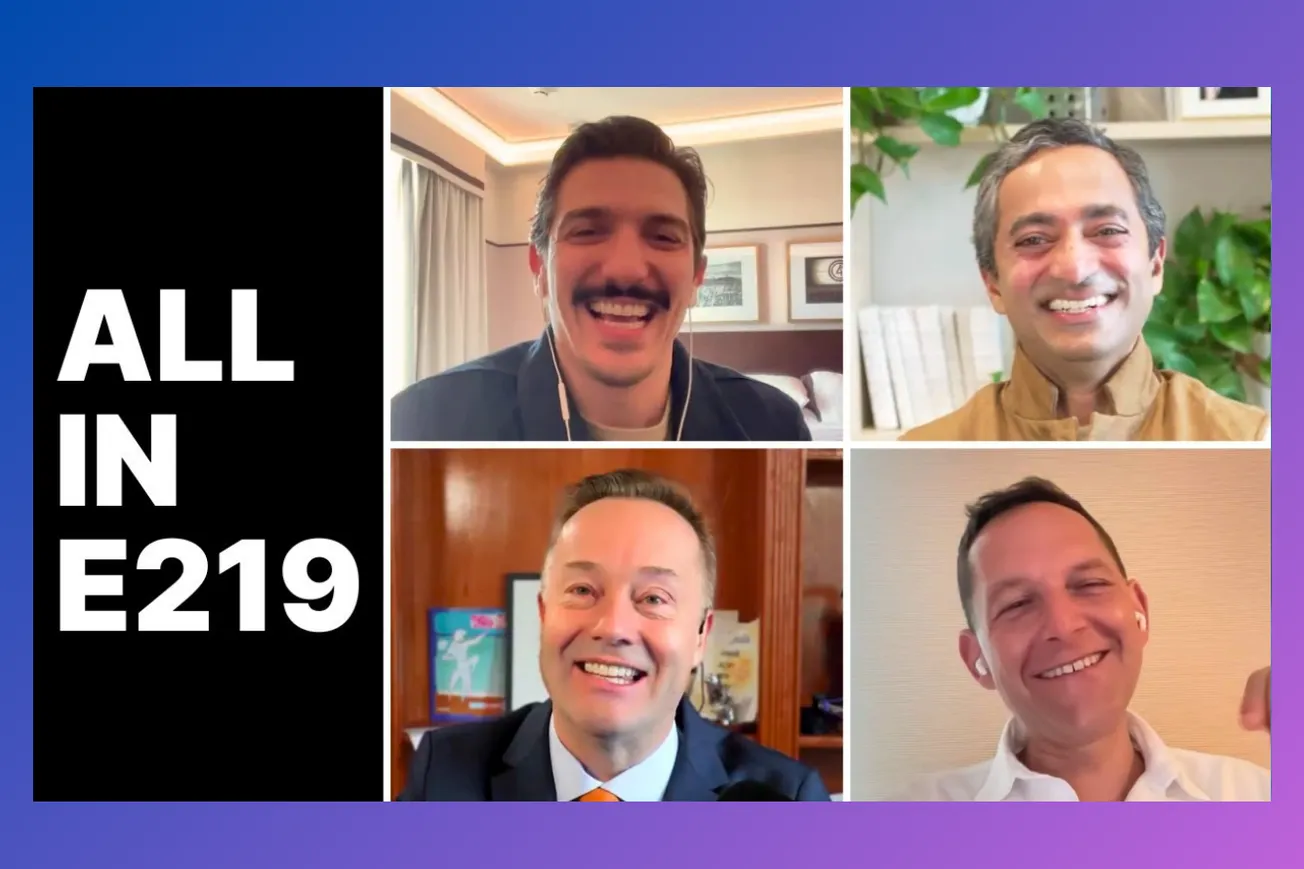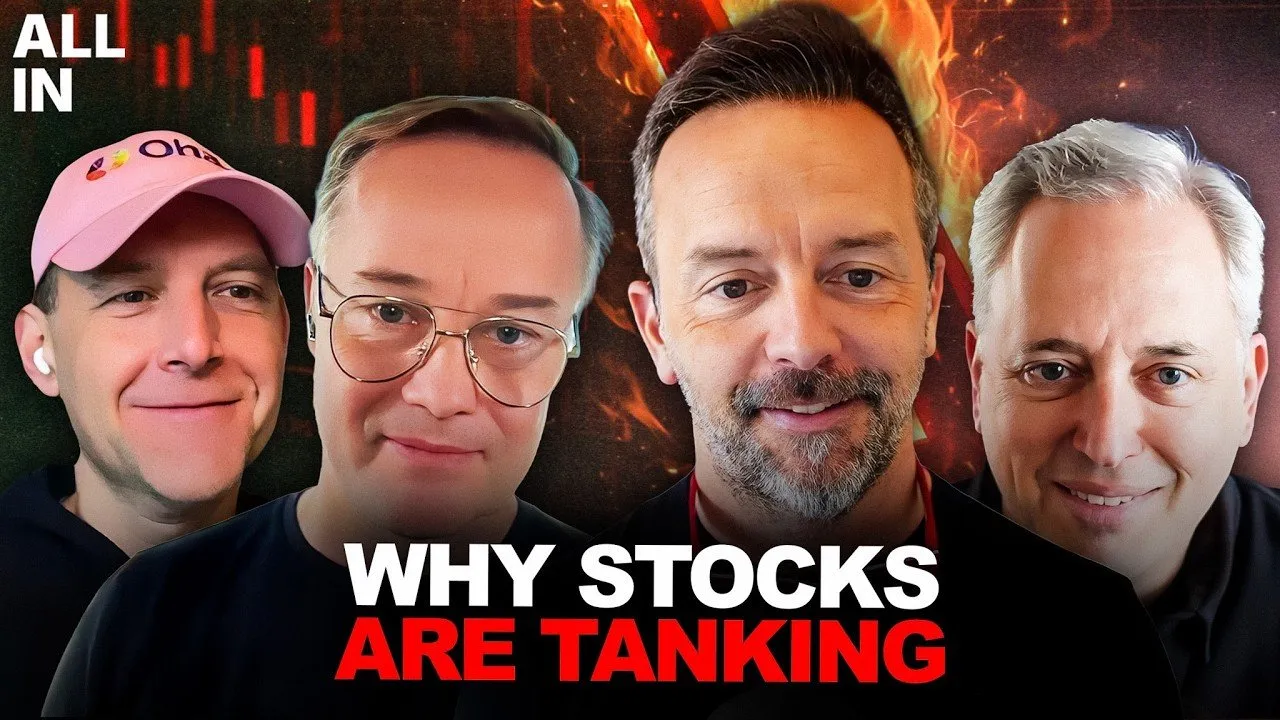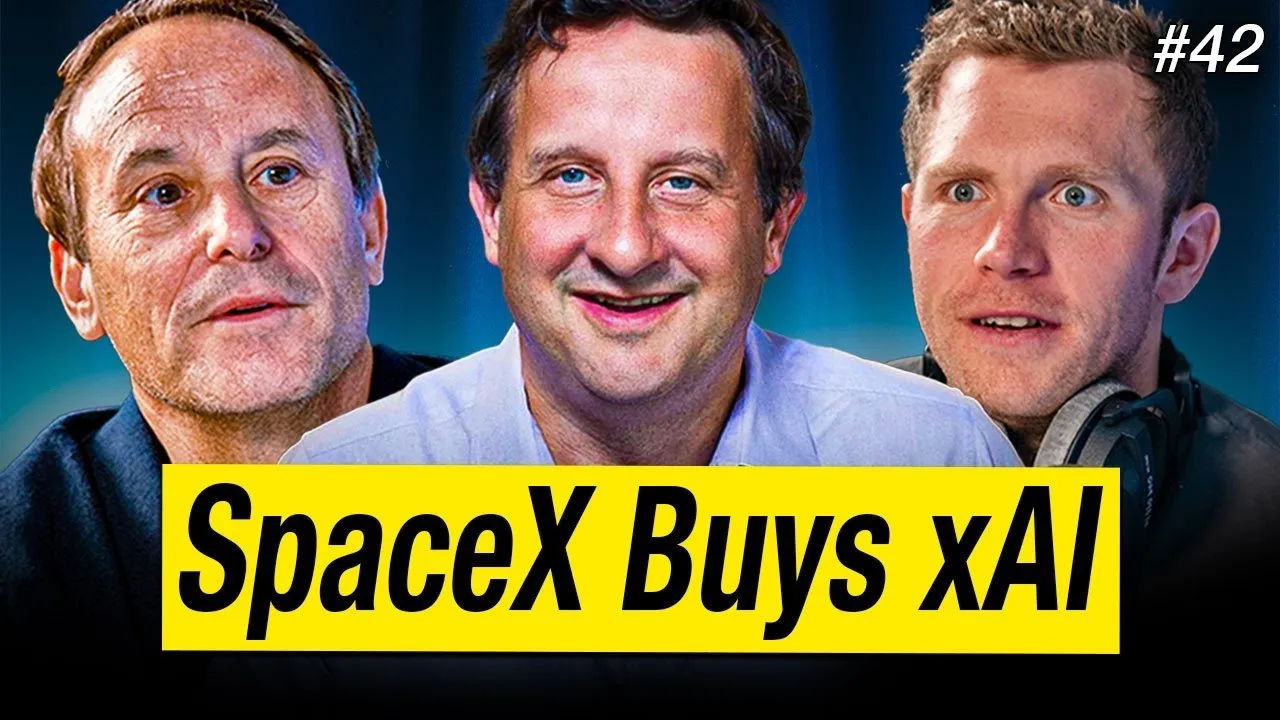Table of Contents
Comedian Andrew Schulz joins the All-In podcast for a masterclass in how economic policy, cultural commentary, and comedy intersect to diagnose America's broken promise.
Andrew Schulz brings his unfiltered perspective to the All-In podcast, dissecting everything from Social Security reform to tariff strategy while revealing how comedy became his path to independence.
Key Takeaways
- Social Security's $15 trillion missed opportunity reveals how forcing middle-class Americans into treasury bonds while wealthy accessed equity markets created systematic inequality
- Housing market rationalization through reduced government mortgage support could drop prices 30-40%, finally enabling first-time homebuyers to enter the American Dream
- Tariff communication failures risk undermining negotiating leverage, as public criticism of strategy reduces effectiveness and creates exploitable weaknesses for foreign competitors
- Gavin Newsom's podcast demonstrates strategic 2028 positioning through active listening and nuanced policy discussions that acknowledge Democratic party positioning mistakes
- Comedy industry transformation shows how independent creators can bypass traditional gatekeepers through direct audience relationships and platform ownership strategies
- American conspiracy obsession reflects institutional trust collapse requiring brutal transparency and honest communication about complex geopolitical relationships and economic realities
- Stock market participation barriers prevent 90% of Americans from building wealth through equity ownership while asset holders have benefited disproportionately since 2008
- Cultural observations reveal how economic anxiety translates into scapegoating and social tension when people lose hope in upward mobility and wealth creation opportunities
Timeline Overview
- 0:00–3:29 — The Besties Intro Andrew Schulz: Introduction of Netflix comedy special star and discussion of fertility challenges facing modern couples
- 3:29–9:35 — Friedberg Hits Science Corner: Future of fertility technology using yamanaka factors to create unlimited egg cells from skin cells at any age
- 9:35–19:36 — Gavin Newsom's Podcast Strategy: Analysis of California governor's 2028 presidential positioning through active listening and nuanced policy discussions
- 19:36–30:44 — Tariff Experiment Risks: Communication failures undermining negotiating leverage and potential long-term economic consequences of trade policy implementation
- 30:44–55:45 — American Dream Breakdown: Housing market distortions, Social Security mismanagement, and systematic wealth inequality preventing middle-class participation
- 55:45–1:11:23 — Stock Market Participation Solutions: Proposals for universal equity ownership through Social Security reform and education initiatives to restore economic hope
- 1:11:23–1:22:25 — Comedy Career Independence: Andrew's journey from MTV to YouTube independence, building cancel-proof audience relationships through direct platform ownership
- 1:22:25–END — State of America Analysis: Cultural observations on institutional trust collapse, conspiracy theories, and Trump administration early performance assessment
Fertility Technology Revolution: Science Meets Personal Reality
- David Freeberg introduces breakthrough Yamanaka factor research enabling conversion of any human cell into stem cells, then into viable egg cells. This technology eliminates the need for invasive egg harvesting procedures and removes age-related fertility limitations that currently constrain reproductive choices for millions of couples.
- Andrew Schulz's Netflix special "Life & Sperm" explores his personal low sperm count journey, highlighting how fertility challenges affect even successful individuals. The combination of male and female fertility issues creates complex emotional dynamics that traditional medical approaches often fail to address adequately.
- Future fertility clinics may operate through simple skin cell sampling rather than complex hormonal treatments and surgical procedures. This approach provides unlimited egg supply at any age, potentially revolutionizing family planning and eliminating the biological clock pressure facing career-focused women.
- IVF process improvements could eliminate the current requirement for multiple embryo creation, addressing religious and ethical concerns about unused embryos. The technology enables single embryo selection with higher success rates, potentially resolving political tensions around reproductive rights legislation.
- Economic implications include democratized access to fertility treatments currently limited by cost and geographic availability. Universal fertility access could reshape demographic trends and family formation patterns across socioeconomic classes.
- Personal fertility experiences reveal the psychological pressure and relationship dynamics involved in assisted reproduction, with Andrew's humor providing insight into how couples navigate medical challenges while maintaining emotional connection and optimism about future family building.
Gavin Newsom's Strategic Podcast Positioning for 2028
- Newsom's podcast demonstrates masterful political repositioning through active listening techniques that break down traditional partisan walls. Unlike typical political communication, he allows opposing viewpoints to fully develop before responding, creating genuine dialogue rather than talking points recitation.
- The strategy acknowledges Democratic party positioning mistakes by presenting issues as nuanced 60/40 or 55/45 splits rather than binary right/wrong positions. This approach signals willingness to admit partial fault while maintaining core policy directions, appealing to voters frustrated with extreme polarization.
- Tax policy discussions reveal sophisticated understanding of comparative burden analysis, explaining how middle-class Californians might actually pay less in total taxes than Florida residents when considering all fees, services, and costs. This data-driven approach counters simplistic anti-California narratives.
- Active listening performance creates psychological alignment between Newsom and viewers, making audience members feel included in problem-solving rather than lectured about predetermined solutions. This technique represents significant departure from traditional political communication strategies.
- 2028 campaign foundation building occurs through systematic unwinding of Democratic liability issues, particularly around cultural topics that alienated working-class voters. The podcast serves as testing ground for messaging approaches that could appeal to broader coalition.
- Rising popularity despite California's ongoing challenges demonstrates effectiveness of direct communication over traditional media coverage. The format allows nuanced policy explanation impossible in sound-bite-driven news cycles or debate formats.
Tariff Strategy: Communication Failures Undermining Negotiation
- Andrew Schulz's negotiation analogy reveals fundamental communication challenges with tariff strategy implementation. Public negotiation reduces leverage by exposing maximum positions and preventing tactical flexibility essential for successful international trade discussions.
- China's systematic response to tariff threats indicates sophisticated analysis of American political dynamics and negotiating patterns. Their unprecedented aggressive positioning suggests confidence in exploiting perceived weaknesses in current strategy implementation.
- Historical precedent from 1776-1913 shows successful tariff-based revenue generation without income taxation, but modern implementation faces complexity of integrated global supply chains and established international relationships requiring careful coordination.
- Communication failures create domestic political vulnerabilities as Trump cannot publicly acknowledge tactical positioning without losing negotiating credibility. This creates perception of inflexibility that foreign negotiators can exploit through calculated resistance strategies.
- Multiple policy objectives complicate message clarity, as tariffs simultaneously address fentanyl trafficking, supply chain resilience, income tax elimination, and industrial policy goals. Unclear prioritization confuses both domestic audiences and international negotiating partners.
- Power centralization concerns arise as businesses seek individual exemptions through direct presidential access, potentially creating corruption perception and undermining rule-of-law principles. This dynamic forces companies into political positioning rather than merit-based policy applications.
Housing Market Distortions and the Broken American Dream
- Chamath's analysis reveals systematic government mortgage market manipulation through Fannie Mae and Freddie Mac conservatorship propping up artificially inflated housing prices. This intervention prevents natural market corrections that would enable first-time homebuyer access to homeownership opportunities.
- Current housing market structure forces 60% of middle-class net worth into single real estate assets rather than diversified investment portfolios. This concentration creates dangerous dependency on continued price appreciation while limiting participation in productive business ownership and wealth creation.
- Warren Buffett's California failure demonstrates political impossibility of rational housing policy reform, as inherited property tax advantages create entrenched interests opposing market rationalization. These policies reduce housing turnover and artificially constrain supply in high-demand markets.
- Housing market crash prediction suggests 30-40% price reductions could restore affordability for median-income families, but requires coordinated policy changes across multiple government agencies and financial institutions. This reset would benefit new buyers while harming existing homeowners significantly.
- Emotional investment in homeownership creates political resistance to market-based solutions, as policies supporting continued price appreciation maintain social stability while preventing new participant entry. This dynamic perpetuates generational wealth inequality through property access restrictions.
- Alternative housing strategies include massive public works projects creating new cities with 3 million affordable homes each, requiring Manhattan Project-scale government commitment to infrastructure development and urban planning innovation.
Social Security's $15 Trillion Missed Opportunity
- David Freeberg's analysis reveals Social Security trust fund's systematic mismanagement through forced treasury bond purchases averaging 4.8% returns while S&P 500 achieved 11% average returns since program inception. This disparity created massive wealth transfer from working class to equity-owning classes.
- Mathematical calculation shows $15 trillion current balance if Social Security invested in S&P 500 since 1971 gold standard abandonment, compared to actual $2.7 trillion treasury balance. This represents roughly one-third of total S&P 500 market capitalization that would be collectively owned by all Americans.
- Current bankruptcy trajectory toward 2032 insolvency requires either benefit cuts, tax increases, or money printing to maintain payments. However, $500 billion immediate investment in equity markets could prevent bankruptcy while providing sustainable growth funding for future obligations.
- Wealth inequality creation occurred through middle-class forced lending to government at low rates while wealthy individuals accessed private equity markets and retirement accounts. This systematic advantage compounded over decades to create current wealth concentration patterns.
- Sovereign wealth fund potential emerges through Social Security equity investment, creating world's largest collective investment pool owned by American workers. This approach aligns individual prosperity with national economic success while maintaining retirement security guarantees.
- Political resistance stems from risk-averse institutional thinking among "well-educated Ivy League trained people" who prioritized safety over growth potential. This conservative approach ignored obvious benefits of investing in America's 500 best companies through index fund diversification strategies.
Stock Market Participation and Wealth Creation Democratization
- Investment education timing reveals critical differences in wealth accumulation patterns, with early exposure at ages 14-18 creating lifelong investment habits and compound growth advantages. Late starter Andrew Schulz began equity investing at 35, highlighting accessibility barriers facing non-financial professionals.
- Emotional connection to American success requires personal investment stake in business outcomes, transforming abstract economic indicators into personal wealth tracking. This psychological alignment reduces anti-business sentiment while increasing support for pro-growth policies and entrepreneur success.
- Crypto adoption among younger demographics reflects desperate search for wealth creation opportunities when traditional markets seem inaccessible or rigged against new participants. This energy could be redirected toward productive equity investment through improved education and access programs.
- Brad Gerstner's "Invest America" concept proposes $1,000 birth investments compounding over 22 years to provide college funding, home down payments, or trade school financing. This approach creates universal stakeholder participation in American economic success from birth through retirement.
- Risk tolerance development requires actual money exposure rather than theoretical education, as psychological pressure of loss creates learning experiences impossible through simulation. Young investors naturally develop patience and simplification skills through market participation experience.
- Universal stock market participation could transform political dynamics by aligning voter interests with business success rather than viewing corporate profits as zero-sum exploitation. This shift would reduce populist resentment while increasing support for innovation and entrepreneurship.
Comedy Career Independence and Platform Strategy
- Andrew's MTV to YouTube transition demonstrates platform migration strategy for creative independence, moving from traditional gatekeeping systems to direct audience relationships. This approach provides creative freedom while maintaining financial viability through advertising revenue and live performance sales.
- Cancel culture resistance emerges through diversified revenue streams and loyal audience relationships built over time through consistent content creation. Unlike network-dependent creators, independent comedians can weather controversy through direct fan support and platform ownership.
- Netflix deal negotiation reveals industry power dynamics shift as streaming services compete with independent platforms for talent. Andrew's leverage comes from proven YouTube success, enabling favorable terms without creative restrictions or content modification requirements.
- Amazon deal buyback story illustrates creative integrity over financial security, as Andrew purchased back his special rather than remove controversial material. This decision required significant financial risk but maintained artistic vision and audience trust.
- Risk tolerance in creative careers mirrors investment psychology, requiring comfort with uncertainty and potential failure in pursuit of larger rewards. Andrew's restaurant management background provided survival skills during early comedy development years.
- Audience diversity contradicts stereotype assumptions about edgy comedy appeal, as Andrew's shows attract broad demographic participation. This success challenges conventional wisdom about content restrictions and market segmentation in entertainment industry.
Cultural Analysis: Institutional Trust and American Anxiety
- Conspiracy theory proliferation reflects low confidence in institutions and information sources, creating demand for alternative explanations when official narratives seem inadequate or contradictory. This trend accelerates during economic stress periods when people seek explanations for declining living standards.
- Anti-Semitic sentiment correlation with economic anxiety reveals historical pattern where minority scapegoating increases during financial hardship periods. Most Americans lack direct Jewish community contact, relying on media stereotypes that become problematic when economic conditions deteriorate and blame assignment begins.
- Geopolitical relationship complexity requires clear public explanation of American strategic interests and alliance benefits, rather than expecting blind acceptance of foreign policy decisions. Failure to communicate these benefits creates vulnerability to conspiracy theories and isolationist sentiment.
- Brutal transparency necessity emerges as only effective response to institutional trust collapse, requiring honest acknowledgment of problems and failures rather than defensive messaging. Americans can handle difficult truths better than perceived deception or patronizing communication.
- Economic disconnection drives cultural polarization as asset owners benefit from monetary policy while working class experiences inflation and stagnant wages. This wealth gap creates resentment toward successful individuals unless broader population gains investment access and upward mobility opportunities.
- Trump administration early assessment suggests cautious optimism while acknowledging execution challenges and communication improvements needed. The focus on bipartisan waste elimination through DOGE represents potential unity opportunity if implemented without partisan knife-twisting or political grandstanding.
Common Questions
Q: How would Social Security equity investment affect market volatility and retiree security?
A: Diversified index investing with government backstop funding provides better long-term returns while maintaining benefit guarantees through fiscal policy support.
Q: Can tariff strategy succeed without clear communication about objectives and timeline?
A: Mixed messaging reduces negotiating effectiveness and creates domestic political vulnerabilities that foreign competitors can exploit through coordinated resistance.
Q: What prevents housing market price corrections that would benefit first-time buyers?
A: Government mortgage market intervention maintains artificial price floors while political resistance prevents reforms that would harm existing homeowners significantly.
Q: How do independent creators build sustainable businesses without traditional industry support?
A: Direct audience relationships through platform ownership provide creative freedom and financial stability superior to network-dependent models during controversy periods.
Q: Why do conspiracy theories gain traction during economic stress periods?
A: Institutional trust collapse combines with scapegoating psychology when people lose economic hope and seek explanations for declining living standards.
Conclusion
Andrew Schulz's appearance on All-In demonstrates how comedy and economics intersect to reveal uncomfortable truths about America's current trajectory. His outsider perspective illuminates policy failures that academic discussions often obscure through technical complexity, while his personal journey from restaurant manager to Netflix star embodies the entrepreneurial spirit that built American prosperity.
The conversation reveals a clear diagnosis of America's broken promise: systematic policies that benefit asset owners while excluding working Americans from wealth creation opportunities. From Social Security's treasury bond trap to housing market manipulation, government interventions have inadvertently created the inequality they claimed to address. The solution requires acknowledging these failures while implementing practical reforms that restore broad-based prosperity.
Perhaps most importantly, the discussion highlights how economic anxiety translates into cultural division and conspiracy thinking when people lose hope in upward mobility. The antidote involves creating universal stakeholder participation in American success through equity ownership, housing affordability, and transparent communication about complex challenges facing the nation.
The path forward demands both policy sophistication and cultural healing, requiring leaders who can explain complex relationships while maintaining authentic connection with diverse constituencies. Whether through Newsom's podcast experiments or Trump's unconventional communication style, Americans hunger for honest dialogue about real problems rather than partisan talking points designed to avoid difficult conversations.









